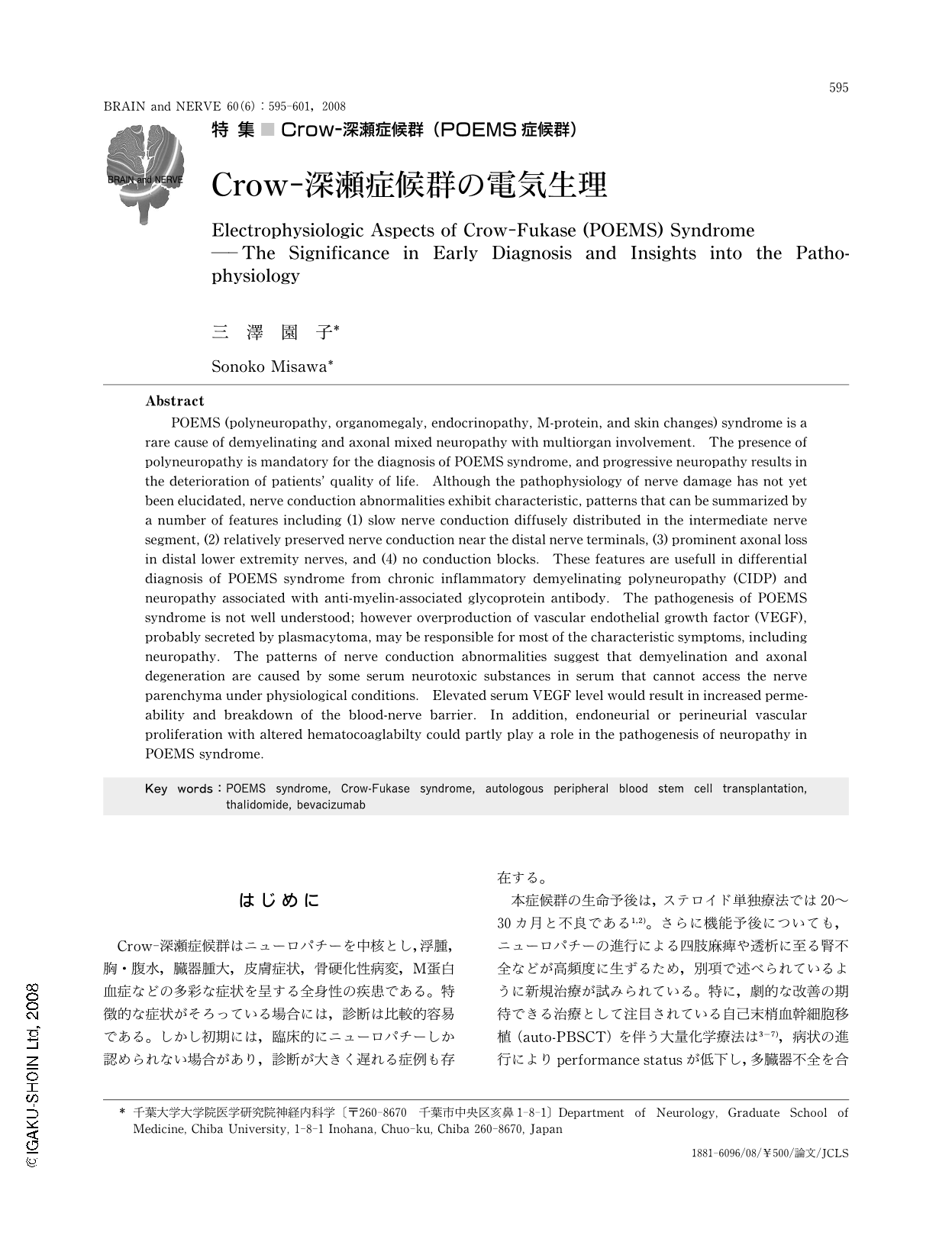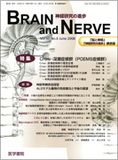Japanese
English
- 有料閲覧
- Abstract 文献概要
- 1ページ目 Look Inside
- 参考文献 Reference
はじめに
Crow-深瀬症候群はニューロパチーを中核とし,浮腫,胸・腹水,臓器腫大,皮膚症状,骨硬化性病変,M蛋白血症などの多彩な症状を呈する全身性の疾患である。特徴的な症状がそろっている場合には,診断は比較的容易である。しかし初期には,臨床的にニューロパチーしか認められない場合があり,診断が大きく遅れる症例も存在する。
本症候群の生命予後は,ステロイド単独療法では20~30カ月と不良である1,2)。さらに機能予後についても,ニューロパチーの進行による四肢麻痺や透析に至る腎不全などが高頻度に生ずるため,別項で述べられているように新規治療が試みられている。特に,劇的な改善の期待できる治療として注目されている自己末梢血幹細胞移植(auto-PBSCT)を伴う大量化学療法は3-7),病状の進行によりperformance statusが低下し,多臓器不全を合併する症例では治療関連死のリスクが増大するため,治療が行えなくなる可能性がある。そのため,早期診断が非常に重要となる。
ニューロパチーはCrow-深瀬症候群の中核症状であり,いずれの報告においても全例に認められる1,8-10)。そのため,神経内科医が診断に関与する機会は多く,その際に神経伝導検査は簡便で非常に有力なツールとなる。ニューロパチーのみを認める初期の段階で,本症候群の診断を支持する有用な補助検査所見としては,血清中の血管内皮増殖因子(vascular endthelian growth factor: VEGF)高値,CTによる微量な胸水・腹水の検出とともに,神経伝導検査における特徴的な所見が挙げられる。腱反射の保たれているような軽症の症例においても,神経伝導検査では明らかな異常所見を認め,その特徴的なパターンは診断の決め手になりうると筆者らは考えている11)。
また,本症候群では脱髄と軸索変性の両者が一次性に生じていると考えられるが,脱髄性ニューロパチーの側面から,慢性炎症性脱髄性多発ニューロパチー(chronic inflammatory demyelinating polyneuropathy: CIDP)と初期に診断される症例も存在する。しかし,本症候群とCIDPの神経伝導異常のパターンは異なっており,神経伝導検査により両者を鑑別することが可能である。
本項では,Crow-深瀬症候群の神経伝導検査所見を概説し病態との関連を考察するとともに,臨床的に問題となりうるCIDP,M蛋白血症を伴う各種ニューロパチーとの鑑別のポイントについて整理する。
Abstract
POEMS (polyneuropathy, organomegaly, endocrinopathy, M-protein, and skin changes) syndrome is a rare cause of demyelinating and axonal mixed neuropathy with multiorgan involvement. The presence of polyneuropathy is mandatory for the diagnosis of POEMS syndrome, and progressive neuropathy results in the deterioration of patients' quality of life. Although the pathophysiology of nerve damage has not yet been elucidated, nerve conduction abnormalities exhibit characteristic, patterns that can be summarized by a number of features including (1) slow nerve conduction diffusely distributed in the intermediate nerve segment, (2) relatively preserved nerve conduction near the distal nerve terminals, (3) prominent axonal loss in distal lower extremity nerves, and (4) no conduction blocks. These features are usefull in differential diagnosis of POEMS syndrome from chronic inflammatory demyelinating polyneuropathy (CIDP) and neuropathy associated with anti-myelin-associated glycoprotein antibody. The pathogenesis of POEMS syndrome is not well understood; however overproduction of vascular endothelial growth factor (VEGF), probably secreted by plasmacytoma, may be responsible for most of the characteristic symptoms, including neuropathy. The patterns of nerve conduction abnormalities suggest that demyelination and axonal degeneration are caused by some serum neurotoxic substances in serum that cannot access the nerve parenchyma under physiological conditions. Elevated serum VEGF level would result in increased permeability and breakdown of the blood-nerve barrier. In addition, endoneurial or perineurial vascular proliferation with altered hematocoaglabilty could partly play a role in the pathogenesis of neuropathy in POEMS syndrome.

Copyright © 2008, Igaku-Shoin Ltd. All rights reserved.


